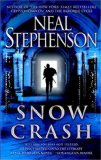Snow Crash: filet of meta-conflict
¶ by Rob FrieselDuring my recent re-read of Neal Stephenson’s Snow Crash, it occurred to me that one of its thematic elements takes the classic rich vs. poor conflict and intimates that it has transmuted into a conflict between a hyper-literate elite vs. an illiterate and/or aliterate Ünterleute. This is by no means a startling or even new revelation. It’s just another incarnation grafted onto the superstructure of meta-conflict that usually goes by the name “Haves-vs.-Have-Nots”. And there are a lot of ways to slice up this particular beast – shit, there are lots of ways to carve up this particular cut of this particular beast: empowerment vs. oppression; advancement vs. stagnation; freedom-to vs. freedom-from… The list goes on ad nauseum.
Abundant echoes of those (and many more) variations of the conflict are jammed into the narrative 1 – so again: that’s not really news and so not the interesting part. What bonked me on the head were two things: one about the story itself and one that aligns it with our most recent political contest here in the States 2.
First, about the story itself: as far as protagonists go, Hiro is pretty unabashedly self-absorbed, decidedly not In It For The Greater Good. Maybe this is just a side effect of post-modernism and implicit hyperreality in so-called cyberpunk literature and its characters. Maybe he’s a not-quite-fully-realized archetypal Libertarian hero. But let’s take a moment to consider that Hiro is not in this to help improve the collective standard of living for just anyone and everyone (i.e., the people on The Raft) – nope, he’s in it for himself and (to a lesser extent) for his conspecifics (i.e., other hackers). And that’s cool, whatever; folks have to look out for their own kind. You can’t save everybody, right? And isn’t that the whole point of that “nam-shub of Enki” business? To cut everyone loose so they can think for themselves and thus save themselves? And with that out of the way, you’re free to let the starving, huddled, illiterate masses float toward shore (as long as they’re all already in the neighborhood) while you jack your hyper-literate self back into the Metaverse to save your buddies.
Believe it or not, I’m not trying to come down hard on Hiro at all. The tone of the narrative gives us enough indication that Hiro (in part influenced by Juanita) does believe that this is the right thing to do. The nam-shub of Enki business unshackles The Raft People, giving them the opportunity to learn and better their respective stations, etc. Whether or not they make it will be up to them 3 but Hiro has (arguably and/or perhaps irresponsibly) cut them free from a neurolinguistic tether that otherwise bound them to one dictatorial master. And this isn’t such a bad thing. But there is an element of it that I think may easily rub someone the wrong way.
This is a hunch but I believe that readers coming from an American background are cultured to expect closure to come in the form of realized opportunities and not nascent opportunities. In other words, somewhere deep down, we want Hiro to lead these people à la Moses out of the desert of poverty 4 instead of just showing them to the edge of town, smashing their chains, and not even bothering to explain that Now Is The Time To Run Like Hell 5. But it’s just fine to fuck with these Reader Expectations; it keeps us honest and (maybe) makes us work a little harder to justify why we relate so easily to this horny, sword-swinging bastard 6.
Now with that in mind, let us briefly turn our attention back to the 2008 Presidential campaigns 7. We saw some of those same narratives being constructed before us: freedom-to vs. freedom-from; advancement innovation vs. stagnation endurance; and perhaps the hyper-literate vs. the aliterate. Would it be too far afield of this writer to speculate that there was something eerily congruous about the McCain/Palin camp and L. Bob Rife’s alignment with the Orthos 8? And in that way, perhaps the novel is more relevant now than it was during its original 1992 publication. Perhaps the measure of our successes during these next four years will be about whether we make strides to close that gap. Our economy is going to be about more than the numbers on balance sheets. It has got to be about literacy, about education, about innovation, and (perhaps most importantly) about our collective national, cultural attitude toward those abstractions.
I suppose we should keep asking ourselves then: How do we go about cutting the wire?
- Sometimes perpendicular to the plot, but let us not digress.[↩]
- And that being said, the second may be a bit of a stretch.[↩]
- But as we see in the earliest chapters, it’s commonplace for these guys to pull together enough English (or other) language skills to skim a binder and run a franchise. But now we’re into the thesis of the book under-cutting itself a bit and that’s a topic for another time.[↩]
- Though we would gratefully do without all of the interstitial wandering. Who has the patience for that shit nowadays?[↩]
- Though Hiro didn’t really even bother showing them to the edge of town, either.[↩]
- Need you any additional reason?[↩]
- I thought I was done thinking about all this after November 5th as well – sorry but there it is.[↩]
- Though I’m unwilling to go so far as to point and say: “LOOK! THEY’RE BOTH FROM ALASKA!!!” Because that would just be opening myself up to ridicule. I’ve got my credibility to consider.[↩]

Leave a Reply